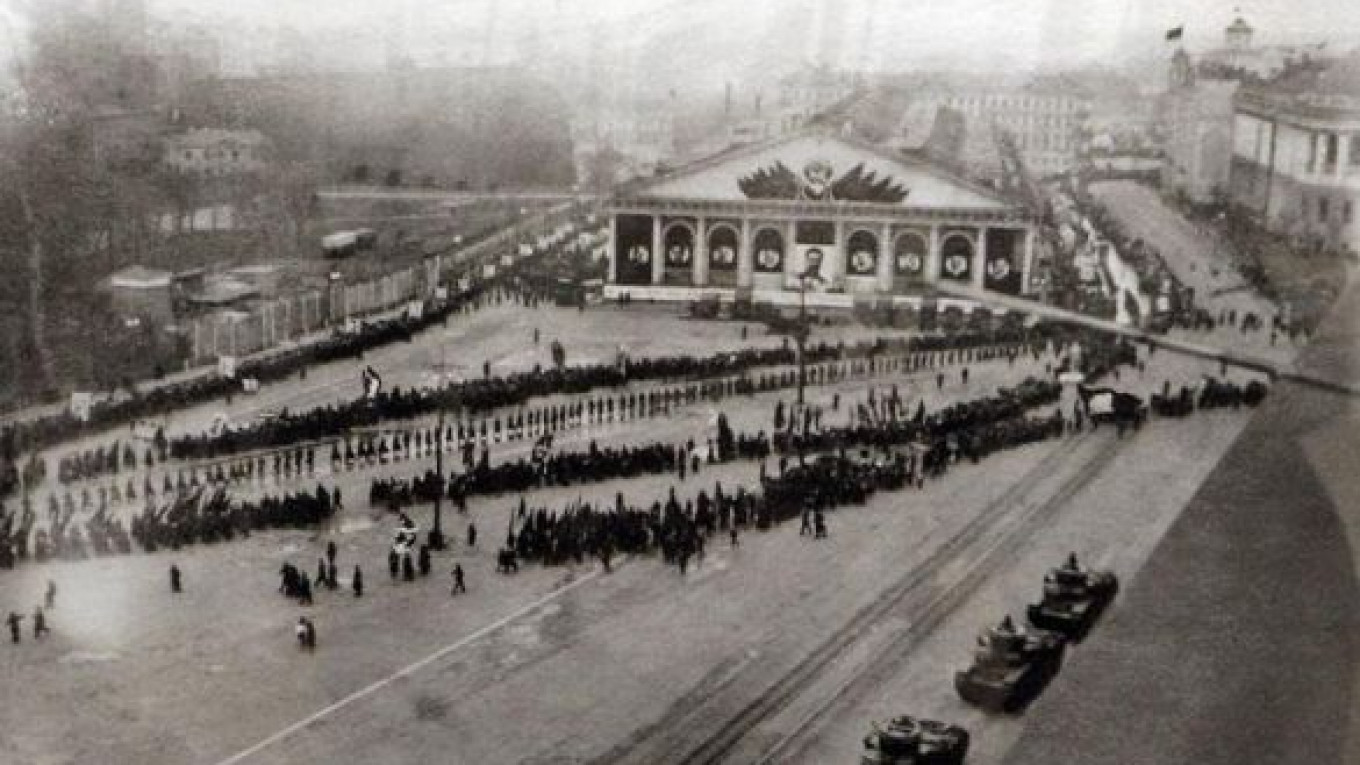Emlen Knight-Davies was 20 years old when she arrived in Moscow in 1937, camera in hand, to accompany her father, Joseph Davies, the second American Ambassador to the Soviet Union. Despite heavy photography restrictions, Knight-Davies boldly captured images of Stalinist Russia.
These exceptional photographs might have been lost in the folds of time, but Knight-Davies's daughter, Mia Grosjean, has undertaken the process of painstakingly restoring her mother's photographs for public viewing.
Grosjean's effort to compile a history of her mother's time in Moscow started in 2001, when Knight-Davies first shared her diaries from that time with her daughter. Six years later, Knight-Davies passed on her photographs. Amazed by the treasure she found in her mother's old boxes, Grosjean decided to enlarge the photographs to better restore and preserve the images.
Grosjean remembers one particular snapshot in her mother's collection, which was syndicated across the United States.
"I said, but mom, why was this picture published all over America? And she said, it's because the shadow of the Kremlin is in her glasses," recalls Grosjean at a lecture on her mother's photographs she gave in Moscow late last year. "And I said … what's the big deal about having the shadow of the Kremlin in your glasses. And she said it was illegal to photograph the Kremlin back then."
Such details become apparent in nearly all of the photographs as Grosjean began to enlarge her mother's collection — an American flag above the embassy building, broken glass testifying to enjoyable dacha nights for foreign service agents in Moscow.
Grosjean realized the importance of her mother's collection but was unsure of what exactly to do with the photographs.
In 2008, Grosjean was invited by the previous American Ambassador John Beyrle to compile a special exhibit of her mother's photography in commemoration of the 75th anniversary of Spaso House, the American ambassador's residence in Moscow. The exhibit pieced together Knight-Davies's restored photographs together with diary entries.
The photographs are now on regular display, and Grosjean's restoration project has grown from family archiving to academic research at the Russian State University for Humanities, funded by a Fulbright grant. One of Grosjean's goals is to locate the buildings and faces in her mother's photographs and find out where everything is today.
Grosjean has traveled to the dacha where her mother spent time relaxing during her time in Russia and has even gone so far as to knock on doors of old buildings that resembled those in her mother's photographs.
"Understanding … the house and the architecture, understanding the history of it is a really wonderful thing for a story," Grosjean said about her research. "You get to understand a plot when you get to understand what a building looks like."
Indeed, Grosjean hopes to put her mark on this period of history. When asked what she would like to do once all of the photographs are restored, Grosjean responded that she envisions writing a book or play, perhaps even working on a documentary film.
Photographs from Stalinist Russia are few and far between, and Knight-Davies's collection of photographs stands out as a historical gem not simply because of its rarity.
With obvious care, Grosjean has restored snapshots, captioning them with rich stories from her mother's diary to create vignettes of late 1930s Russia, worthy of any audience, inside and outside Russia.
A Message from The Moscow Times:
Dear readers,
We are facing unprecedented challenges. Russia's Prosecutor General's Office has designated The Moscow Times as an "undesirable" organization, criminalizing our work and putting our staff at risk of prosecution. This follows our earlier unjust labeling as a "foreign agent."
These actions are direct attempts to silence independent journalism in Russia. The authorities claim our work "discredits the decisions of the Russian leadership." We see things differently: we strive to provide accurate, unbiased reporting on Russia.
We, the journalists of The Moscow Times, refuse to be silenced. But to continue our work, we need your help.
Your support, no matter how small, makes a world of difference. If you can, please support us monthly starting from just $2. It's quick to set up, and every contribution makes a significant impact.
By supporting The Moscow Times, you're defending open, independent journalism in the face of repression. Thank you for standing with us.
Remind me later.






